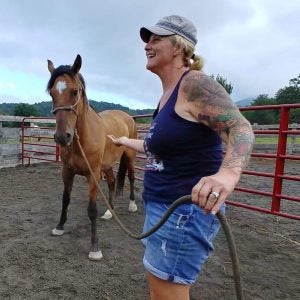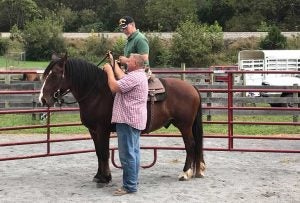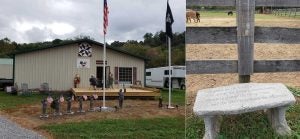BUCHANAN, Virginia — Jason Hogancamp, a former soldier who served four tours in combat zones, today is a burly 48-year-old living near the Blue Ridge Mountains. He smiles a lot and is easy to talk to, especially when he recounts his lifetime love for horses, from growing up on a horse farm in Southside Virginia to working with problem horses in Kentucky and on a Gypsy Vanner farm in Washington.
What is less apparent is his long-time struggle with post-traumatic stress disorder. It manifests through hypervigilance, night terrors, and survivor guilt. He has attempted suicide four times, in the hopes of being able to “sleep” and escape the torment trapped in his mind. He’s on his fourth marriage, the first three dissolving because he closed himself off emotionally and verbally from his spouses.
“In my mind, I couldn’t tell people that I was hurting without an outward reason for that hurt,” says Hogancamp, taking long pauses as he discusses this part of his life. “I prayed so many nights for a diagnosis of a disease that people would understand, like cancer, even though I know it’s crazy to pray for cancer.”
Hogancamp used to bounce in bars and often found himself getting into fights. Being able to associate his mental pain with something physical was a coping mechanism. It took many years for him to find his place in the world after military service. The old “normal” was certainly gone, but he has recently begun to redefine and accept a new normal.
After psychotherapy, anger management classes, and individual counseling, his path brought him to the front gate of New Freedom Farm, where veterans and first responders with PTSD and traumatic brain injuries find a way to heal.
“I’m only now able to start being who I was supposed to be,” he says.
Lois Fritz and her husband, Mitchell, bought the 13-acre property that would become New Freedom Farm a few days before Christmas 2015. When they closed on the place, the Fritzes had just $17 to their name, and the farm was a shabby, muddy, weedy mess. Fritz would dub it a “disaster,” but not unlike the veterans she hoped to one day help, Fritz saw the potential for recovery.
Fritz, who served in the Navy, clearly cares for her fellow veterans. What she envisioned with the creation of New Freedom Farm was a soothing, pastoral environment in which service members could talk freely about their service over a horse, with little pressure to fit the therapeutic mold. The hope was that these horses would help veterans escape the hurt and open up to others with shared experiences.
Having been a forensic nurse examiner, Fritz herself has PTSD, an accumulation of trauma from her childhood as well as her proximity to suicides and victims with gunshot wounds.
“That was really horrific work,” she says.
Traditional therapy failed to help her. PTSD affects everyone differently, and it’s nearly impossible to understand for someone on the outside looking in. A relatable example is to imagine being in a traumatic car crash on the interstate. For the rest of time, you might avoid that stretch of road to keep from reliving the trauma. For someone with PTSD, however, the trauma lives in their head — inescapable, constant, and not in a physical location. Often, the only hope is to find a diversion — something to take the strain away, even if only temporarily.
“The war is within their brain forever,” explains Fritz, whose various arm tattoos — including dog tags, a folded flag, the serenity prayer, her son’s boots, and a clock that represents her sobriety — tell stories of both her service and its aftermath.
To help Fritz deal with it, a therapist suggested she try something she had never done before: a horseback riding lesson. Fritz felt so much better when she was outside and on a horse that she made the goal of starting this farm to help others with PTSD.
Fritz and her husband fundraised $6 at a time for each fence post and each upgrade they did to the farm. It has never had paid staffers and has very little overhead compared with other equestrian facilities. Fritz continued working at a hospital in the early days to help subsidize the farm before getting so busy with the horses that she decided to dedicate her full attention to New Freedom Farm.

The farm formally opened on Oct. 6, 2016. It operates on “faith and donations,” Fritz says. It never charges veterans, first responders, or their families to ride or talk through what they are feeling. Fritz estimates that between six and 12 veterans come by every week. Some show up daily while others may be there only a day or two.
“I’m beyond blessed that so many veterans come here and that this is real,” she says.
The farm’s youngest veteran is 24 years old, while the oldest is 94. Veterans from every major American war since World War II are represented.
“What’s great to see is the inter-generations of veterans collaborating and working together,” Fritz says. “It’s amazing to hear a young guy say he’s mad and then an older Marine say, ‘I held it in for 55 years. Don’t do that to yourself.’ It’s simply astounding.”
In addition to being a regular gathering place for former servicemen and women, the farm holds concerts, equine clinics, and other events to raise awareness about PTSD and to fundraise. A recent barnyard barbecue was attended by more than 300 veterans and family members. For most events, the food is donated. Once, a truck carrying hamburgers broke down nearby, and the 911 dispatcher recommended the driver give the food to New Freedom Farm, since it wasn’t going to reach its intended destination in time.
Fritz is particularly sensitive to opening up the farm on holidays such as the Fourth of July and Memorial Day, which she notes have a tendency to trigger alcoholic people to drink. New Freedom Farm doesn’t allow alcohol on the premises and is offered as a safe place. The barn doors also open on Thanksgiving, when as many as 100 veterans and their families are expected to show up in 2018. There were 24 people for its first Thanksgiving in 2016, and the farm had 60 in 2017.
These kinds of events are further incentive for veterans to be where many already want to be, to come where they’re already welcomed.
Being here offers an immense sense of peace and calm, said Caryl Connolly, a longtime volunteer and board member for the nonprofit farm. She calls it magical.
Connolly, who is Mitchell Fritz’s mom, worked in a Veterans Affairs hospital in New Jersey before moving to Virginia. These days, at New Freedom Farm, she has been able to connect more closely with veterans than she was able to at the VA, and she’s more emotionally vested in them.
“There are no expectations for them to do anything or be anything other than who they are,” Connolly says.
If New Freedom Farm isn’t technically therapy, then how does it work?
“I got into horses because I could not talk to people,” says Hogancamp, whose long Army career began in 1988 and included deployments to Panama, Honduras, and Korea. He was a demolition specialist focused on mobility and counter-mobility before joining the infantry.
He is patriotic and takes pride in his service — but it left fierce mental scars.
He attempted suicide so that he would no longer have to feel guilty about losing people under his command and wouldn’t have to smell or hear those triggers. For so long, he struggled to have to explain to people why he was the way he was.
“I know where I was emotionally, physically, mentally, and I know where I am now. I know where horses and the Lord brought me out of,” Hogancamp says. “It became evident to me that I was unsuccessful at marriage, unsuccessful at suicide, although I tried very hard at both, [and] that if I was going to be here, I needed to learn how to communicate.”
Often, if you tell people you have PTSD, you’re categorized negatively, especially as a veteran. Even though trauma such as sexual assault or the death of a loved one can lead to PTSD in anyone, PTSD carries a stigma because media often cite it in association with mass shootings, such as the one that happened this month at a Thousand Oaks, California, bar that left 13 people dead.

At New Freedom Farm, communication is a vital part of coping with PTSD in a positive way grounded in healing. Here, they call it peer-to-peer therapy.
Brian Moore is a father of four and served three tours. As a member of the New Hampshire National Guard, he went from being a history teacher and middle school principal to becoming Sgt. Moore after the 9/11 attacks. In 2003, when fighting in Iraq began, his was one of the first states to deploy en masse for that conflict.
National Guard service is different from active-duty service, but many don’t realize the significant overlap that exists. Guardsmen go through the same training as active-duty troops, just not every day. It takes longer to gear up for combat, but Moore says four Guardsmen can be trained for the same cost as a single active soldier.
Most importantly, there is always an expectation as a Guardsman that he or she will be going to war.
Moore’s first tour began in Mosul, Iraq, and took him to Saddam Hussein’s hometown of Tikrit. Much of his time was spent escorting convoys, going from base to base and living out of a truck. As Moore puts it, there was very little “Big Army” involved in his daily life; on the ground, individuals did what they needed to do to move people and supplies as safely as possible. Equipment had to be retrofitted, and there were a significant number of gun battles with enemy forces.
With his second tour, Moore volunteered to go to Afghanistan from a sense of unfinished business. He was in his 40s by that time and served as an embedded advisor to the Afghan Army, where he worked closely with those troops and learned some Dari, a language spoken there that resembles Farsi.
Coming off of being a history teacher, he took pride in his experiences in Afghanistan, standing on a mountain pass once traveled by Alexander the Great, “choking on the same dust,” as he puts it, that Alexander did.
He thought he was done after two tours, as he was getting older and had already been banged up a bit. Yet, six months into being home, a New Hampshire unit was getting set to deploy, the youngest in the state’s history and one that was looking for solid leadership. Moore accompanied that unit to Baghdad in 2007. Iraq was considered a “gentler war” by this point, as shops had reopened, the region resembled less of a war zone, and soldiers didn’t have to speed down streets.
However, Moore was stationed near volatile Sadr City, getting rocketed and mortared daily. Each time a round was incoming, a siren would go off, giving American forces just three to five seconds to seek cover in one of the many concrete bunkers.
“You never knew where it was going to land,” Moore says.
One day, a mortar round landed right behind Moore before he could get to shelter. Shrapnel tore into him, causing nerve damage and leading to a concussion. Moore was one of 24 members of that unit who were wounded during the deployment, while eight others were killed — a large toll for one company.
His military career ended there, as did his teaching career. Migraines and other pains affected him, and the seeds of PTSD were laid. Moore moved to Appomattox, Virginia, and became Commander of a local Chapter of the Military Order of the Purple Heart. In 2015, he published a book, “Purple Hearts & Wounded Spirits,” which helped him process everything he had experienced in combat.
When he found his way to New Freedom Farm, he felt that he could find benefit both for himself and in helping others process their trauma. As a family man and having been in the civilian world for a time before his service, he had a family support structure than many younger veterans with PTSD never get to have.
“What I try to do with other vets, especially if they’re struggling, is let them know it’s all right,” Moore says.
The former Guardsman hadn’t been on a horse since he was a kid, so as he learned to ride again, he worked with a fellow veteran, shared stories, and found ways to heal together. In this setting, the sense of isolation that those with PTSD may feel is removed.
“Nobody judges anyone,” Moore says. “It doesn’t matter where you’ve been or what you’ve been through, or even whatever heartaches you may have caused yourself. Just relax and sit and share and let them vent.”
That’s what peer-to-peer means.
There are many therapeutic opportunities involving horses, and they’re all differently focused. Research has shown positive effects for those with PTSD, but finding the right approach depends on where you are in the healing process. Peer-to-peer has worked very well for many of the veterans who have come to New Freedom Farm.
Hogancamp is on full disability but says that he’s now in a sort of “remission” from PTSD, meaning he can sleep and doesn’t think about his buddies so much. He also doesn’t dwell on former wives or family members he no longer gets to see. He credits Fritz — she’s the “real deal,” he says — but even more he credits being around the horses. These are animals that don’t laugh at you, shame you, or get freaked out because of PTSD. These are loving animals that instill a sense of purpose in veterans.
“I can go out to a barn and stand next to a horse, hold onto a horse, talk to a horse, and he wouldn’t care if I cried. He wouldn’t look at me funny,” Hogancamp says. “I’m a strong man, and yet I’m feeble sometimes. The horses accept you for who you are every single day that you come to the barn.”
They run the fence when you show up, or they toss their head in happiness to see you. Hogancamp quips that horses have four legs because their hearts are too big to carry with just two.

Many of the more than a dozen adult animals at the farm are rescues; Fritz has partnered with the Mustang Heritage Foundation and the Bureau of Land Management to bring them here. It sends a fitting message for how the horses themselves rescue so many veterans in need.
People may be standoffish, Hogancamp says, but “it’s never an awkward moment with a horse. It’s taught me to be more in control of who I am and what I am. It’s allowed me to be vulnerable and not hold back.”
At New Freedom Farm, the well-known statistic about 22 veterans dying by suicide every day — a rate 50 percent higher than the general population — is a strong motivator. Many of the veterans who struggle with PTSD and re-entry into civilian life know exactly what brings a person to that point.
“I understand how fragile life is,” Hogancamp says. “My hope is that through places like this and through education that our society learns a better way to deal with post-traumatic stress disorder and to deal with people who have it.”
Connolly, Lois Fritz’s mother-in-law, believes that places such as New Freedom Farm help raise awareness about how society deals with people who have post-traumatic stress and that it aids veterans in their recovery.
“It allows them to get out of their head for a half hour or an hour,” she says. “Is it permanent? No, but they do get moments of feeling peaceful and not having all that stuff in their heads going on.”
Ryan Tipps is the managing editor for AGDAILY. He has covered farming since 2011, and his writing has been honored by state- and national-level agricultural organizations.



